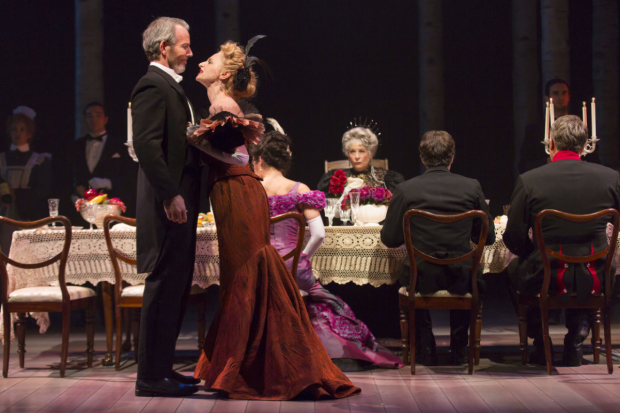A Little Night Music
An elegant and memorable revival of ”A Little Night Music” opens the Huntington Theatre Company season.

(© T. Charles Erickson)
A Little Night Music, Stephen Sondheim's 1973 musical in waltz-time, brushes the issues of life, love, and death, but compared with later shows like Sweeney Todd, Into the Woods, and Passion, Night Music seems positively giddy with optimism. The current revival has been elegantly staged and is beautifully sung by the 17-member ensemble of actor-singers gathered by director, Peter DuBois, on the stage of the Huntington Theatre. This combination makes for a satisfying, and at moments downright thrilling, evening of theater, and a fitting tribute to Sondheim's stellar reputation.
Sondheim's musical roundelay of romances that come to a head over the course of a weekend in the countryside, is based on the Ingmar Bergman's 1955 film, Smiles of a Summer Night. The musical matches Fredrik Egerman (Stephen Bogardus) to his young bride, Anne (Morgan Kirner); Anne to her stepson, Henrik (a petulant Pablo Torres); Anne's confidante, Petra (a perky McCaela Donovan) with Henrik; and both the Count Carl-Magnus Malcolm (Mike McGowan) and Fredrick with the actress Desiree Armfeldt (British actress Haydn Gwynne).
Presiding over the to-and-fro-ing of the weekend is Bobbie Steinbach as the venerable Madame Armfeldt, a living symbol of the significance of memory to the plot. A premiere courtesan in her youth, she brings a jaded eye to the ever-changing coupling while taking pleasure in the knowledge that she has lived her life to the fullest, according to her desires. Her granddaughter, Fredrika (the charming Lauren Weintraub) is always at her side, absorbing her advice but taking her own measure of the adults surrounding her. Steinbach's gravelly voice of authority and a stellar sense of timing bring a contrast to the shimmering vocal outpourings from the guests whom Desiree invites to her mother's house.
Gwynne, cast as the celebrity of Sondheim's gathering, gives the stand-out performance of the production. As Desiree, she plays a compassionate, but now tired, woman who has spent her professional life touring the regional theaters in her native Sweden. She's self-aware about growing older and about the toll that age has taken on her diminishing career. With a vocal cadence that enunciates every word of Sondheim's literate lyrics, she endows the bittersweet emotions embedded in "Send in the Clowns" with a subtle but layered ennui, nailing the unshed tears implicit in the metaphor. Bogardus portrays a likable, boyish Fredrik, trying to relive his youth through an inappropriate marriage.
DuBois has structured a visual portrayal of the 3/4 tempos that animate much of the score by blocking the characters into trios for many of the scenes, and choreographer, Daniel Pelzig, has provided a space-devouring, waltz extravaganza to open and close the show. The hero of the evening is music director Jonathan Mastro for creating a chiming chorale out of the individual voices. Many of them are worth noting, particularly the surprise of a trilling soprano from Kirner (still a student at the Boston Conservatory); the operatic delivery by McGowan; and the sardonic but expressive Lauren Molina, who brings an edge to the role of his Countess.
The furtive meetings of each romantic pair play out on a set (designed by Derek McLane) that's dressed by simple settings of curtains and draperies, a forest of birch trees, and a large garden entrance of French doors that fly in and out from above. Robert Morgan devised 19th-century period costumes, with jewel-like tones for the gowns, that further enhance the play space. The second-act scene with the principals seated at a sumptuous dinner table, brilliantly lit by Jeff Croiter, makes an unforgettable visual image.
The entanglements during this weekend in the country turn A Little Night Music into a paean to the adventures and mistakes of the past, but also a toast to an uncertain future. Sondheim only hints that the happy endings might someday take a dark turn — but the world won't end just yet.








